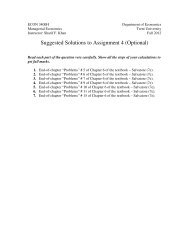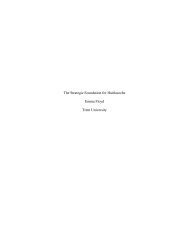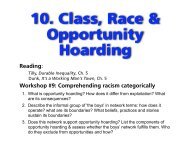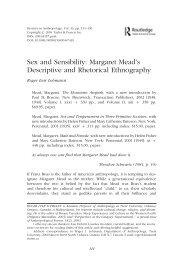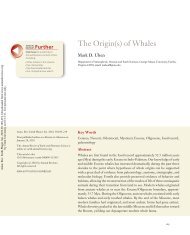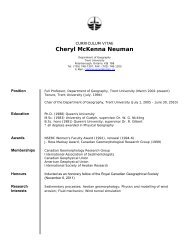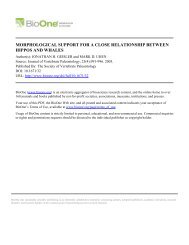REO FORTUNE'S PSYCHOLOGICAL THEORY OF CULTURAL ...
REO FORTUNE'S PSYCHOLOGICAL THEORY OF CULTURAL ...
REO FORTUNE'S PSYCHOLOGICAL THEORY OF CULTURAL ...
You also want an ePaper? Increase the reach of your titles
YUMPU automatically turns print PDFs into web optimized ePapers that Google loves.
286 Pacifi c Studies, Vol. 32, Nos. 2/3—June/Sept. 2009<br />
to interpret his dream as actually about the British flag: the flowers were<br />
the correct colors and the blue irises are known as “flags.” The dream represented<br />
to Fortune a reversal of his waking views: he had given a patriotic<br />
speech (though in favor of the antipatriotic Labour Party), and he wallowed<br />
in the beauty of the flag, though he rejected flag waving.<br />
Part of Fortune accepted conservative attitudes prevailing in the surrounding<br />
culture, though on the surface he held views more typical of liberals.<br />
Rather than opposing the individual to the collective, Fortune opposed<br />
the views of two sectors of his society. He was both a Labour supporter<br />
and a loyal citizen of the British Empire. On the surface he rejected the<br />
mindless patriotism of the latter, yet on a deeper level he reveled in it. He<br />
also rejected the ostensible disloyalty to tradition of the Labour Party, while<br />
also recognizing that this was an inherent part of its message. Such are the<br />
dilemmas of living socially, as a member of groups with conflicting views.<br />
Continuities and Breaks between Fortune’s Psychology and<br />
Anthropology<br />
Fortune entered anthropology with a strong psychological foundation and<br />
a fascination for both dreams and the presence of what one might call<br />
contradictory “alleles” of culture in any individual’s mind, each with its own<br />
kinds of dominance and recessiveness. What traces did this leave in his<br />
later anthropological work? Looking at his subsequent monographs, three<br />
on Oceania (Dobu, Manus, and Arapesh) and one on Native North America<br />
(Omaha), a subtle influence can be seen in Fortune’s awareness of dreams<br />
and the ambivalences of individuals arising from cultural and social contradictions.<br />
However, despite their potential to enrich both his accounts and<br />
his explanations, Fortune’s earlier theoretical interests are not systematically<br />
followed up. I see several possible explanations for this, each coming into<br />
play at different points. First, he may have seen the task of ethnography as<br />
fundamentally different from psychology. Second, simply documenting<br />
social, cultural, and linguistic systems may have consumed so much of his<br />
time in the field that there was insufficient opportunity for him to explicitly<br />
use and test his theory. Dobrin and Bashkow (2006) and Molloy (2009) all<br />
attest to the intensity of his cultural immersion in fieldwork. Third, he may<br />
simply have moved on to pursue other interests. I examine these major<br />
works for signs of how the younger, psychologist Fortune influenced the<br />
slightly older, post–Margaret Mead, anthropologist Fortune.<br />
In Sorcerers of Dobu ([1932a] 1963, 181), Fortune noted that Dobuans<br />
believed personal souls leave the body during dreams, and that dream<br />
pacs-32-02-06.indd 286 9/7/2009 2:32:34 PM



